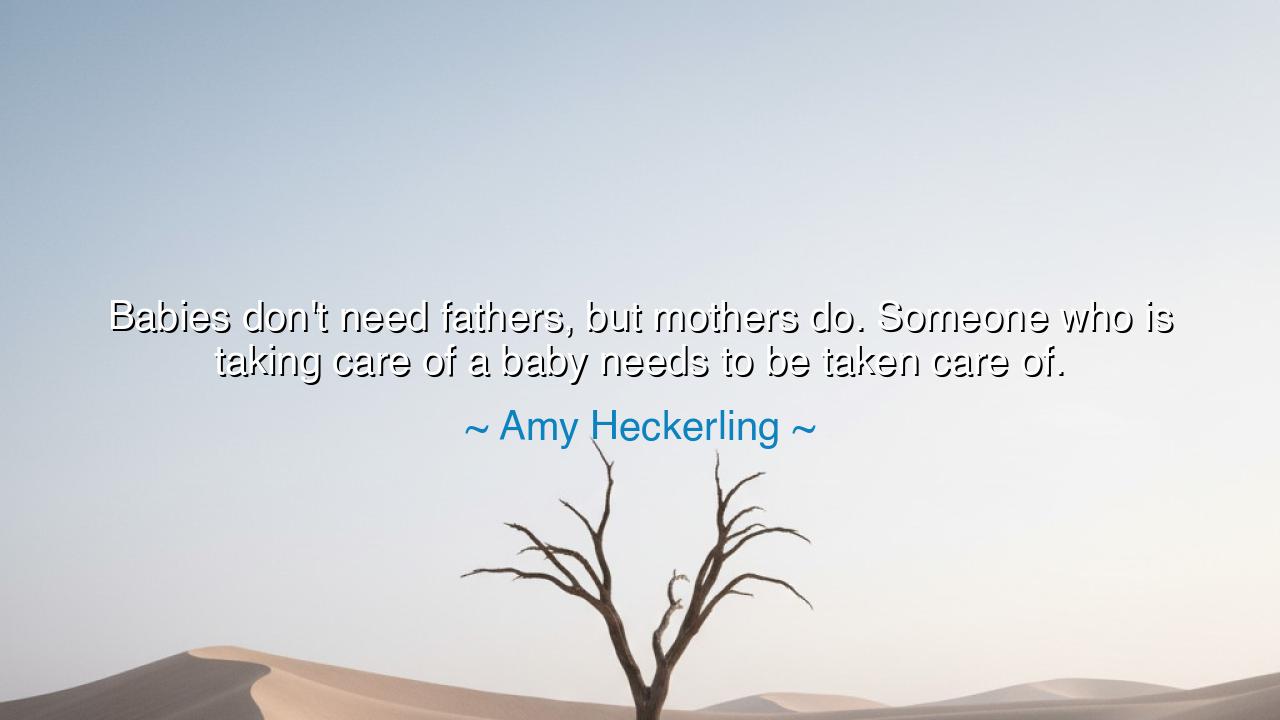
Babies don't need fathers, but mothers do. Someone who is taking
Babies don't need fathers, but mothers do. Someone who is taking care of a baby needs to be taken care of.






The words of Amy Heckerling, “Babies don’t need fathers, but mothers do. Someone who is taking care of a baby needs to be taken care of,” carry a truth both tender and profound. They speak to the sacred web of human dependence—the divine design by which life sustains life. In this saying lies not a denial of the father’s worth, but a revelation of balance: that while an infant’s first bond is to the mother, the mother herself is sustained by love, support, and strength beyond her own. Thus, Heckerling reminds us that no life nurtures alone, and that even the giver of life must be given care. The circle of compassion, if it is to hold, must be unbroken.
From the beginning of time, the mother has been the first shelter of the world. Her body bears the burden of creation; her hands cradle the dawn of every human soul. Yet in her labor, both of the womb and the heart, she is vulnerable—fragile in body, weary in spirit. To say that “babies don’t need fathers” is not to cast away the father’s place, but to unveil a deeper truth: the infant’s earliest survival rests wholly upon the mother’s health, and thus she must not stand alone. The father’s role, then, is not merely to protect the child, but to guard the guardian—to ensure that the one who gives life is not broken by it.
Even the ancients knew this truth. In the old households of Greece and Rome, when a child was born, it was not only the infant who was tended, but the mother who was surrounded by care. The family gathered round her as though she were a vessel carrying the sacred flame of life itself. Her nourishment, her rest, her peace—these were treated as holy duties. For they understood what many have since forgotten: that a mother’s strength is the cornerstone of civilization. If she falters, the world itself begins to tremble. Thus, to care for the mother is to care for the child, the home, and the future all at once.
Consider the story of Mary Wollstonecraft, the great advocate for women’s rights, who gave her life bringing another into the world. In her time, there was little understanding of the care a mother required, and she died soon after childbirth—leaving her daughter, Mary Shelley, to grow into a woman haunted by loss, yet gifted with the same fierce spirit of creation. This tragedy is not hers alone, but a reflection of a universal truth ignored: when the caregiver is not cared for, the lineage of love is wounded. Heckerling’s words echo through such stories as a call to compassion—to recognize that the burden of nurturing must never fall upon one set of shoulders alone.
In the modern age, where independence is praised and vulnerability is hidden, many mothers are left to carry the world in silence. They tend their children with exhausted hands, forgetting that their own hearts are still in need of tending. But Heckerling, with her gentle wisdom, lifts the veil on this quiet struggle. She reminds us that caregiving is not a solitary act—it is a sacred partnership. The one who rocks the cradle must herself be held. The one who feeds the hungry must herself be fed. This truth transcends gender and culture; it is the rhythm of human existence.
To the fathers, the friends, the companions, and the kin, this quote is both invitation and commandment: take care of the caretaker. Let your strength become her refuge; let your patience become her peace. Do not mistake her resilience for endless endurance, nor her love for self-sufficiency. When you offer her rest, you are strengthening the very heart of your home. When you see her not as a tireless giver but as a soul in need of grace, you fulfill one of life’s highest duties: the protection of love itself.
And to the mothers, let this be your reminder: you, too, are worthy of care. You are not meant to pour endlessly without being filled. Seek help without shame, rest without guilt, and remember that to accept care is also to teach your children wisdom—the wisdom that love must flow in both directions to endure.
So let us hold Amy Heckerling’s words as a torch for our age: that no one who gives life should walk alone, that the one who nurtures must be nurtured, that the strength of a family is found not in solitude but in shared devotion. For when the mother is cared for, the child thrives, the father finds purpose, and the household stands firm against the storms of time. Thus the circle of life endures—each caring for the other, each sustained by the same eternal law of love.






AAdministratorAdministrator
Welcome, honored guests. Please leave a comment, we will respond soon